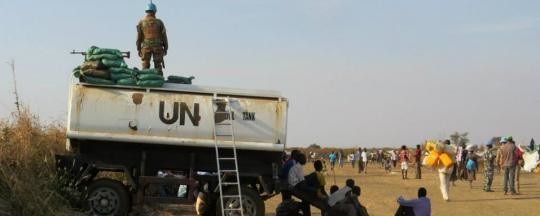The “protection of civilians” camps in United Nations bases in South Sudan where about 200,000 people have taken shelter from the civil war will remain necessary for “years to come” despite a peace agreement signed by the country’s rival warring factions, an independent report by the International Organization for Migration concluded.
The report, titled “If We Leave, We Are Killed,” said that due to slow implementation of the peace agreement it is likely that civilians will remain in the camps for much longer. The camps exist because people fear being killed outside by armed groups particularly government soldiers.
The IOM report recommended that UNMISS and aid workers begin long term planning for improving the camps, which have turned into places of awful humanitarian conditions over the last two years of fighting as tens of thousands of people keep pouring in.
“This is a long term situation,” said Michael Arensen, the researcher who wrote the report based on interviews with over 100 displaced people, UNMISS staff, aid workers, and others. Arensen was speaking at a panel discussion in Juba to launch the report.
The “PoC” sites were established in the early days of the conflict when South Sudanese people fleeing ethnic massacres and war forced their way into UN bases to seek protection. The UN Mission in South Sudan is mandated to protect the civilians from armed attack, while aid agencies work inside to ensure the people have what they need to stay alive.
Many credit the PoC sites with saving thousands of lives or more because civilians had safe havens to enter whenever fighting broke out.
However, the camps are dangerously overcrowded and the people inside do not have enough food, clean water, or schools. Countless people have died of disease due to the poor conditions inside.
Arensen said one reason for the difficulties improving the camps is because UNMISS and aid workers have believed for the last two years that the people inside the camps would leave, so they never put in place enough measures to ensure the conditions would meet basic humanitarian standards for the long term.
“The discussion has always been, well, next month they’re going to leave therefore we’re not going to actually do long term planning,” Arensen explained. “This has been a problem for two years. At some point we’re going to have to accept that look, whether it’s convenient or whether it’s helpful or whether it’s difficult, we have to accept that these camps are going to be here for a while longer.”
Arensen said he hopes his report will encourage open discussion among aid workers and UNMISS to tackle the issue of ensuring that the hundreds of thousands of South Sudanese people living on UN bases have what they need to survive for years to come.
‘Everyone go home? Not going to happen’
David Derthick, country director of IOM, said during the panel discussion it would be nice to believe that because there’s a peace agreement people are just going to go home, but the reality is different.
“In Juba, the land and houses of many of the poeple in the sites have been taken over. Where are they going to go?” he said. “Think of Malakal. There’s a peace agreement, everyone can go home, right? It’s not going to happen. The vast majority of IDPs in the PoC in Malakal are Shilluk from Malakal town. They’re not going to be happy to go across to the west bank.”
Derthick said there are 120,000 people in the Bentiu UN base. “Can they go home to their villages? Many of those villages dont exist. The men were killed, the women were raped, the children were abducted, schools were torn down,” he explained.
The IOM report comes amid a time of contentious debate between UNMISS and aid agencies. UNMISS officials have argued that they should focus on helping people return to their homes because there is a peace agreement. But aid workers say the sites need to improve because people still fear to go home.
Derthick said there is too much focus on trying to get people to leave the protection of civilians camps instead of working to make sure that the people living in the UN bases have what they need to survive.
“I’ve been to dozens and dozens and dozens of meetings on ‘how can we get these people out of here? how can we relocate?'” he said. “But I don’t think I’ve ever been to a single meeting where we’ve all sat down together and said, ‘how can we provide protection and services in the best way possible?’ A meeting where we have the [UN] mission there.”
Speaking at the event, the head of UNMISS’ Relief, Rehabilitation, and Protection Section Sam Muhumure disagreed with the IOM report’s findings and rejected the notion that the camps would remain operational in South Sudan for years.
“Our analysis of the future is that PoC sites are not expected to stay for a long time,” he said. “We propose that all efforts should be geared to creating the conditions…for IDPs to return, while at the same time maintaining the services for the IDPs in the PoC sites and doing it better. We should not wait for a perfect situation to manifest before starting supporting returns because that time will not come.”
Related:
UN in South Sudan declines to protect new IDP camp after deadly attack (30 Mar.)




